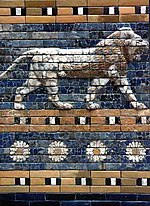
Back مطبخ عراقي Arabic İraq mətbəxi Azerbaijani ইরাকি রন্ধনশৈলী Bengali/Bangla Irácká kuchyně Czech Irakische Küche German Iraka kuirarto Esperanto Gastronomía de Irak Spanish آشپزی عراقی Persian Irakilainen keittiö Finnish Cuisine irakienne French
| Part of a series on the |
| Culture of Iraq |
|---|
 |
| History |
| People |
| Languages |
| Cuisine |
| Religion |
| Art |
| Literature |
| Music |
| Sport |
Iraqi cuisine is a Middle Eastern cuisine that has its origins in the ancient Near East culture of the fertile crescent.[1][2][3] Tablets found in ancient ruins in Iraq show recipes prepared in the temples during religious festivals—the first cookbooks in the world.[3][4] Ancient Iraq's cultural sophistication extended to the culinary arts.[3]
The Iraqi kitchen reached its zenith in the Islamic Golden Age when Baghdad was the capital of the Abbasid Caliphate (750–1258 AD).
In Northern Iraq pomegranate is added to dolma. In Southern Iraq, fish is a staple. The center of the country is known for its rice dishes and sweets.
In terms of agriculture, Iraq harks back to ancient Mesopotamia,[5][6][7] growing wheat and crops requiring winter chill such as apples and stone fruits.[7] Lower Mesopotamia grows rice and barley, citrus fruits, and is responsible for Iraq's position as one of the world's largest producer of dates.
Pork consumption is forbidden to Muslims in Iraq, in accordance with Sharia, the Islamic law.

- ^ "Tasty Ancient Recipes from Mesopotamia – History et cetera". Retrieved 2021-12-27.
- ^ "Iraqi Cuisine". worldfood.guide. Retrieved 2021-12-27.
- ^ a b c http://www.thingsasian.com/stories-photos/3592 Foods of Iraq: Enshrined With A Long History. Habeeb Salloum.
- ^ "Inspired by the oldest clay tablet 'cookbook' in the world (1700 BC) | Foodpairing / blog". Foodpairing. 2015-09-15. Retrieved 2020-05-29.
- ^ "The Ancient Mesopotamian Tablet as Cookbook | Roundtable". Lapham’s Quarterly. 11 June 2019.
- ^ "Iraqi Cuisine". worldfood.guide.
- ^ a b Davidson, Alan; Jaine, Tom (2006). The Oxford Companion to Food. Oxford University Press. p. 405. ISBN 978-0-19-280681-9.